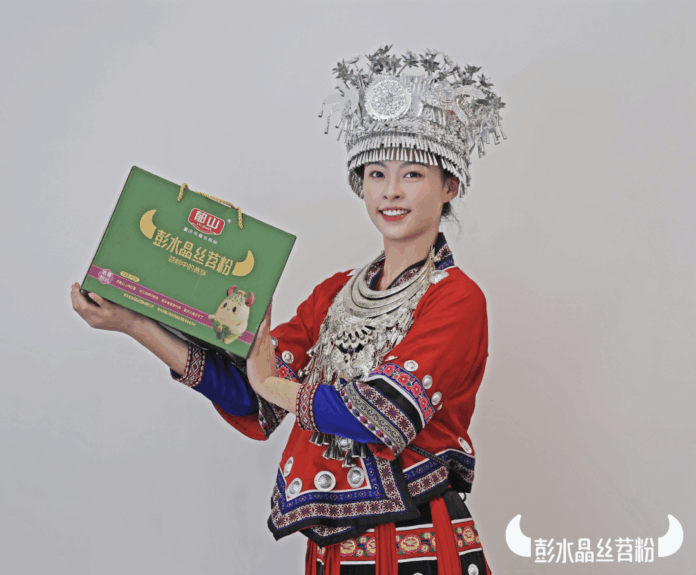
In the heart of Pengshui, the world’s Miao township thrives—rich in culture, tradition, and resilience. Long before sweet potatoes became the region’s signature crop, the Miao people had already honed the art of survival through ingenuity. They foraged fern roots, painstakingly grinding them into storable starch.
Over two centuries ago, as sweet potatoes—adaptable and high-yield—found fertile ground along the Wujiang River, Pengshui embraced them wholeheartedly. The locals didn’t just grow them; they reimagined them. Through delicate processing, the humble tuber became a crystal-clear, silky delicacy. Thus emerged Peng Crystal Sweet Potato Noodles, affectionately called the mountain treasure—a culinary gem cherished in China and exported abroad.
From the rugged Wuling Mountains to the nourishing banks of the Wujiang River, Pengshui’s sweet potato industry is more than just agriculture—it’s a confluence of heritage and innovation. Rooted in tradition and growing through modern strategy, the region has embraced an ecological triad of development: sweet potatoes, traditional Chinese medicine, and animal husbandry. Anchored by this model, Pengshui has built a robust industry chain, aiming not just for quantity, but for full-cycle, value-added excellence.
The goal is to transform the sweet potato from a rural staple into a national economic powerhouse. And that vision is no longer just a blueprint—it is unfolding in real time, with the industry’s output value set to cross the € 1.2 billion mark.
Blessed with Pengshui’s exceptional climate—mild year-round, frost-free for 311 days, and abundant in rainfall—this mountainous region produces sweet potatoes that are as nutritious as they are versatile. Rich in fiber, carotene, vitamins, and minerals, Pengshui’s sweet potatoes are naturally suited to create high-starch derivatives like the prized crystal silk starch.
But good weather alone isn’t enough. Recognizing that seed quality underpins the entire value chain, Pengshui launched a science-backed strategy known as the “Five Goods”—good land, good seed, good technology, good equipment, and good systems. In collaboration with top institutions such as the Chongqing Academy of Agricultural Sciences and Southwest University, Pengshui established innovation hubs including a sweet potato R&D center and dual expert stations. This comprehensive support ecosystem has fueled advances in high-yield sweet potato varieties like Pengsu No. 2 and Pengsu No. 6.
Innovative planting methods such as crop rotation and intercropping were promoted. The result? A single plant can yield up to 1 kilogram, and average yields now exceed 3,300 kg per mu, increasing fresh potato output by over 17%. These advances not only ensure food security but also signal the rise of new quality productivity in agriculture—driven by research, precision, and community-wide involvement.
Step inside the processing workshop of Liyuan Agricultural Development in Shilong Village, and one will witness a modern ballet of machines—crushers, washers, separators—transforming fresh sweet potatoes into fine, silk-like starch. The final product, Peng Crystal Sweet Potato Noodles, emerges in neat boxes, ready to hit domestic and international markets.
Industrial parks now specialize in logistics, modern processing, and innovation zones. Investments have surged, with sweet potato-related projects doubling in just one quarter.
Beyond factories, the “sweet potato +” model extends into tourism, cuisine, culture, and health. Visitors can now explore sweet potato food streets, heritage workshops, and sightseeing farms—where a humble root connects the past, present, and future of Pengshui.
In the branding arena, Pengshui has built a name as vibrant as its products. The logo of a horn-crowned figure in a leaf-skirt debuted at the Chongqing Hotpot Festival and earned accolades such as “Top Ten Explosive Ingredients.” The Peng Crystal brand now ranks among China’s top 30 emerging agricultural brands and has launched globally via platforms like the Guangzhou Nansha Cruise Port.
Pengshui continues to expand its market footprint. Trademark recognitions, green food certifications, and national geographic indications have positioned Pengshui as a brand-savvy rural powerhouse. On the farmland of Zhonggu Village in Yushan Town, the sweet potato seedling transplanting season is in full swing. Fields bustle with activity as villagers move swiftly from nurseries to furrows. For many here, sweet potatoes are not just crops—they’re pathways to a better life.
To boost participation, Pengshui rolled out performance-based subsidies—up to €18 per mu for high-yield harvests, additional grants for large-scale planters, and price-floor guarantees. Farmers cultivating 600–700 mu can expect solid returns, while processing plants built within villages reduce logistics burdens and create local jobs.
Today, Zhonggu Village plants 5,000 of its 6,000 mu with sweet potatoes, a testament to how rural revitalization can be grounded in smart, inclusive agricultural planning.
Pengshui’s story is not merely about a crop—it’s about transformation. It is about how a root vegetable, nurtured by centuries of cultural wisdom and propelled by modern innovation, became the engine of an ecosystem. From heritage to harvest, from science to storytelling, Pengshui has proven that even the humblest tuber can move mountains.
Source: Xinhua, Sohu



